Dan Levy Cried Over the End of Schitt's Creek (and You Will Too)
Dan Levy can’t recall exactly how long it took, but it was months, not days. He’d been patiently scouring eBay, biding his time, before he finally found the exact Helmut Lang hoodie, in his size, that had lived in his brain like a virus since before Schitt’s Creek even premiered.
I’m sitting on a pleasantly plush sofa, overlooking the quiet neighborhood in which Levy has made his Los Angeles home, as he tries to explain to me why this extremely specific sartorial choice was so important to him. "I felt like it was so something that David Rose would need," he says. As the person who both created and played David for five seasons on Schitt’s Creek, with the sixth and final season on the horizon, Levy should know. And so he looked and looked until he finally found it—and then one day there it was on the screen, all black and with plumage, saying a whole lot about David Rose’s personality without saying a word.
We’ve known each other for all of 15 minutes, but it is already very clear to me that Dan Levy is not the kind of person who does anything accidentally. He has similarly high and exacting standards for the products he uses in his own life, which hinges on the self-sufficiency that has made him one of TV’s most self-possessed rising stars. Even this interview—originally scheduled for dinner at a nearby restaurant—was moved to Levy’s home so he could be around to sign for a package.
When we meet, Levy is at the end of a long day spent in the editing bay, working on the final cuts of the final episodes of Schitt’s Creek. Tomorrow, he’ll hop on a plane to begin the next leg of the Schitt’s Creek tour: a live, extended celebration of the series, performed in sold-out theaters full of adoring fans. "It’s like campaigning,” he says, smiling and raising his thick eyebrows over his glasses, “with a lot less at stake."
But now—for a couple of hours, at least—Dan Levy is looking backward, not forward. Over a glass of Chardonnay in his stylish-but-cozy living room, Levy went deep on a few of his favorite things, and reflected on the remarkable rise of Schitt’s Creek and the characters and choices that have turned it into the feel-good TV show of these feel-bad times.
Watch:
10 Things Dan Levy Can't Live Without
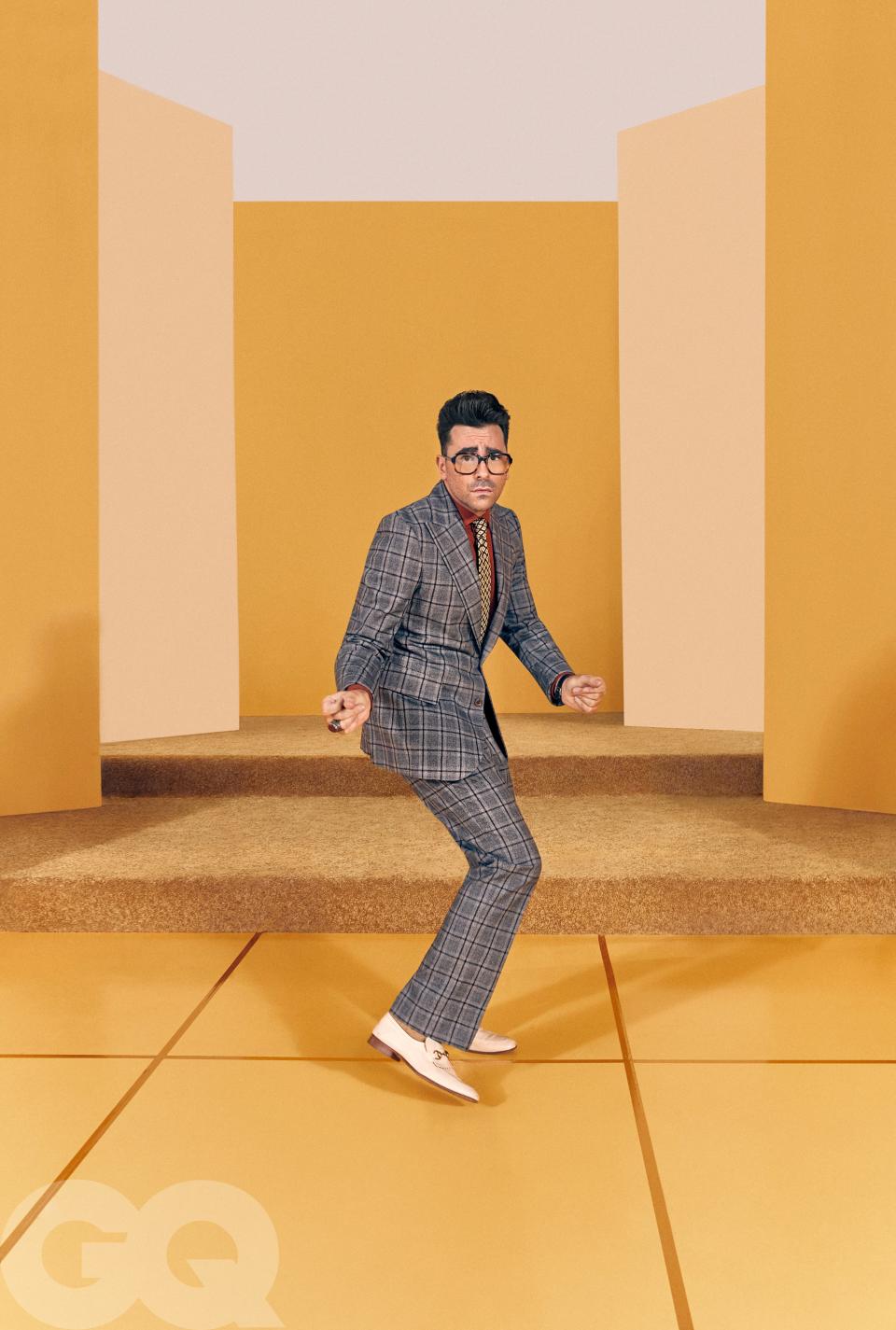
GQ: Schitt’s Creek premiered in 2015. That’s a fairly long time ago—but even after five seasons, it feels like the show is still picking up steam. Season five earned Schitt’s Creek’s best-ever reviews and its first Emmy nominations. As someone on the inside, do you have a sense of why and how the show keeps growing every year?
Dan Levy: I don't know how it happened. I think inherently, the structure of the show always lent itself to: the more you watch, the more you'll care. It was always our intention that you grow along with the family. That the first season presents people in a very superficial light—and season after season, if we were given the opportunity, we would peel back the layers on these people.
By the end of season two, we had the first time [the Rose family says] "I love you" to each other in the barn—which was really the potential end of the series. And also the beginning. You can't just turn people on a dime. The show itself was a slow burn, and fortunately we had the sort of runway to let it breathe and let the audience grow. It took 26 episodes to earn that.
As a creator, writer, director, and star on Schitt’s Creek, what has it been like living through a year that’s essentially a series of professional goodbyes?
We had to say so many goodbyes. We said goodbye to our sets. We said goodbye to certain characters that didn't come with us on location. It was just a lot of goodbyes. It did get to a point where I had to tell the team, "We can't be acknowledging all the lasts, because it's going to ruin me." We can't say, "Well, this is the last time Dan picks up a pen," because I'll cry, and I don't want to cry over having picked up a pen. It's not worth the tears.
I obviously don’t want you to spoil anything—but on a personal level, how was the last day of shooting?
It was really, really hard. The last day of shooting was the most emotional day I think I've ever had in my life. I cried for, I want to say, five straight hours, to the point where I had a splitting headache and didn't know what to do with my life. I wept when I took David's shoes off. I will never wear those shoes again—nor do I want to—but I was very sad to take them off.
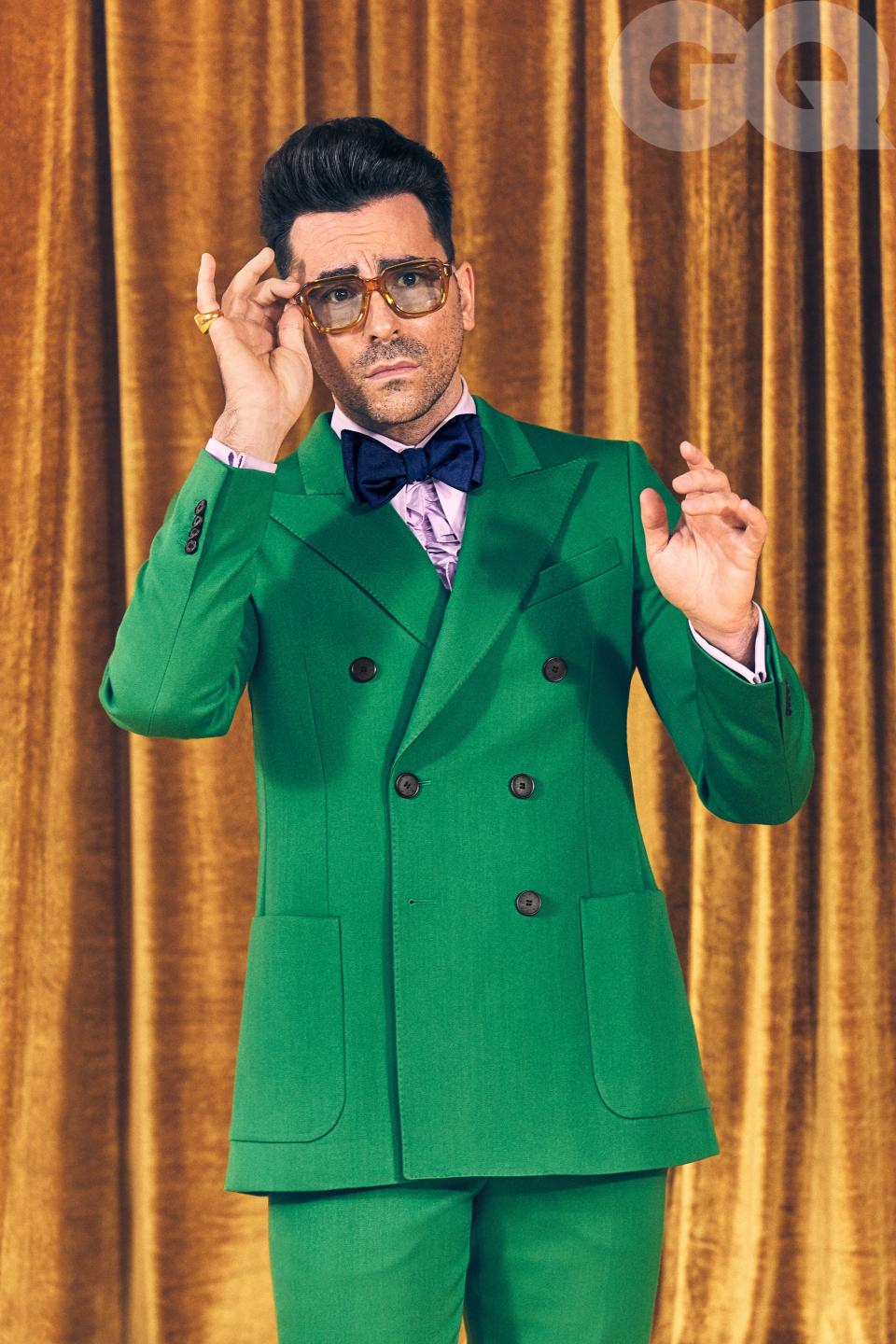
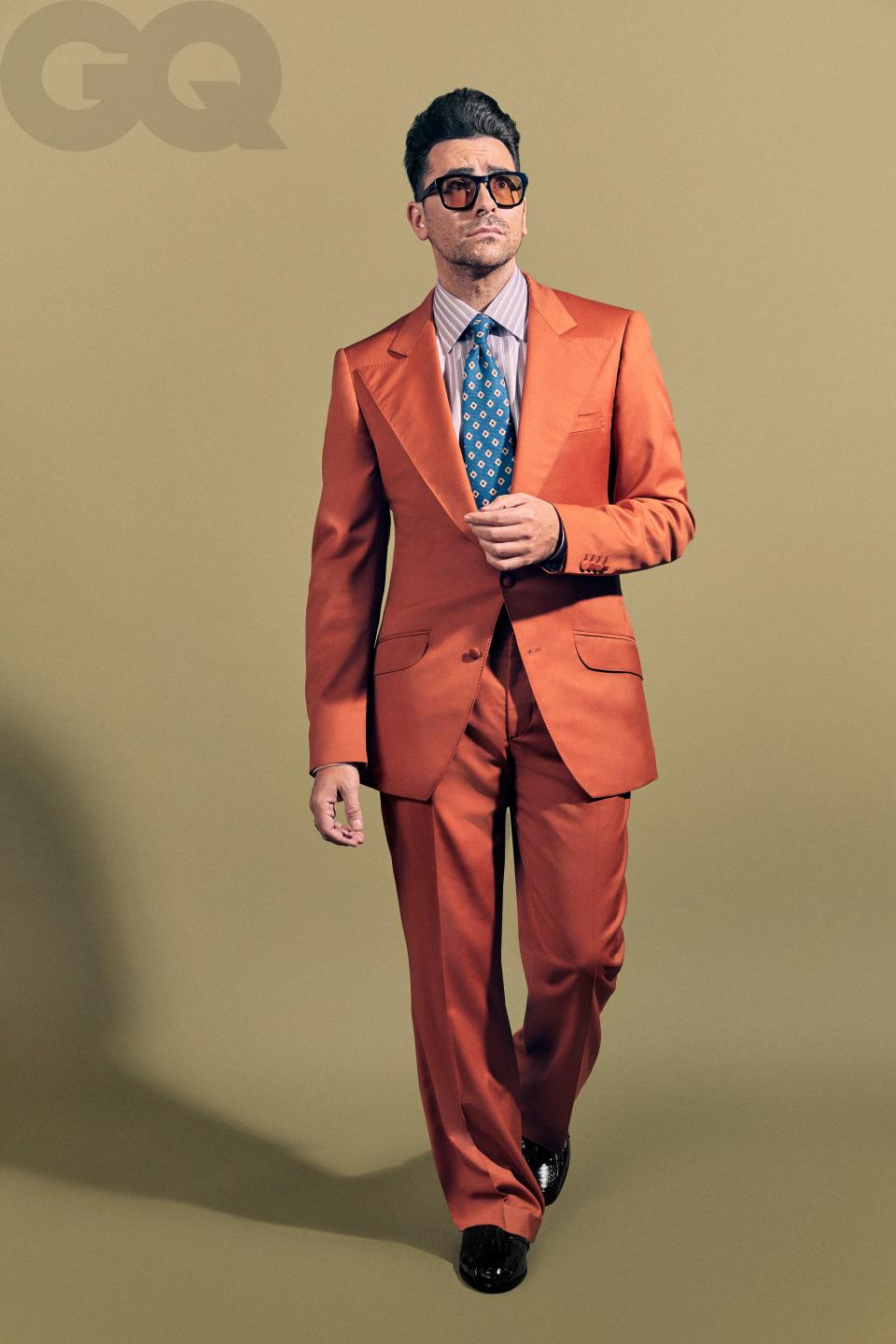
As you’ve gone through the process of writing and shooting and editing the final season over the past year, have you ever thought, Shit, I wish we had a season seven after all?
No. I wasn't ready to go, but the story was set up to be finished. I wish there was more story to tell, because I would love to do this forever—but respecting the characters and respecting the quality of the storytelling, it just felt like, "This is it." I had intended to end it in season five, and then we got picked up for two seasons. And I thought, Okay, well…now I can spend 28 episodes instead of 14 building the last couple chapters of this series. The minute I knew that was the minute I started writing to the end.
Let’s go way back. You originally pitched Schitt’s Creek to premium channels like HBO and Showtime. How much has the show changed from your initial concept to what it is now?
Completely different. I don't think we knew what it was back then. It was a 14-minute pilot that we shot for no money. The characters were kind of different. It really wasn't until we got the first season pick-up, and we sat in that writers’ room and figured out what is this show about. That's when the show came to life.
A clear turning point, for both the show and for your character specifically, was when Patrick came into the series. When he was introduced, you didn’t know for sure that he would ultimately turn out to be David’s lifelong partner, right?
I went into it with the hope that he would become a romantic love interest for David. I knew [actor Noah Reid, who plays Patrick] socially—but I had never acted with him, so I didn't know what our chemistry would be like. I didn't have time to go to his audition and run the scenes with him. That's why the end of season three ends the way it does, with the kiss in the car. A kiss could lead to more, or it could lead to nothing.
In the context of TV history, one thing that’s particularly striking about David and Patrick’s relationship is that the highs and lows aren’t really any different than those that might be faced by a heterosexual couple. Schitt’s Creek is very consciously—and, at this point, very famously—a town in which homophobia and other kinds of bigotry just…don’t exist.
In a way, I wrote it as a response to my own growing up: trying to see myself on television, and really not seeing gay characters represented casually. Every time there was a gay character, it was the butt of a joke, or they were a caricature, or they were in trouble, or they were killed. All of that is representing different elements of the culture—but I never saw a gay character just fall in love, and have it be okay, and become a better person for it.
So it was a very simple choice that I made. But one that I had no idea would affect a kind of ripple. That people would respond in the way that they have. I've had letters from people who found the show while they were contemplating suicide. I've had people who were kicked out of their homes because they were queer, and the show was a family for them when they didn't have one. There were people whose parents watched the show and changed their understanding or perception of who their children were because they saw parents on the show accepting their kids—and as a result, they accepted their children. You really don't expect that when you go set out to write a comedy.

Has anything about the reaction to David and Patrick’s relationship surprised you?
I was expecting a lot more pushback to the physicality. That was an active choice. I wanted them to kiss every time they saw each other. As couples do. I didn't want to tiptoe around the physicality, out of any kind of fear that someone, somewhere in America wouldn't like it. Change the channel. At this point, you have 900 million television shows on the air. If this is not for you, change the channel.
And I can probably count on one hand the bigoted social-media responses I've gotten. Granted: I haven't gone out looking for them—but usually, you can sort of see them as you're scrolling through a feed. People are cheering for these people. I don't know how, I don't know why, because I think there have been couples in the past that have been met with a lot more sort of friction than we have. Maybe it's time. Maybe we've come to a place where we've moved past that. There have been so many shows, and actors, and storytellers who have paved the way for me to be able to tell the stories that I'm telling.
David and Patrick’s relationship has also been at the center of several of the show’s most celebrated and fan-pleasing moments—including one early, major turning point, when Patrick serenaded David with a cover of Tina Turner’s "Simply the Best." How did that episode, and that scene, come together?
I guess I drew from my own experiences with…myself. And friends of mine who had been on dates with people who sang to them—and it was a deal-breaker. And I thought, Well, that's a very clear, very big risk, and something that would deeply unsettle David as a character. The idea that things are going okay…and now his boyfriend wants to perform a song at an open-mic night. I mean, that is bone-chilling—and I think for David [especially] bone-chilling, because it means that if this goes sour, that's it. There's no coming back from watching someone you're falling in love with massacre a song in front of a group of people.
So we thought, What an interesting scenario to put David in, something that's so vulnerable, and something that he is so skeptical about—and then reveal to the audience Noah's voice and his skills. Because we knew they were there, but no one else did.
Why, of all songs, was it "Simply the Best"?
I've always thought it was one of the most beautifully written pop songs in history. Because of the tempo of it, and because it plays as sort of a fast-paced song, a lot of people skip over just how profound those lyrics are. I, on the other hand, would listen to it and get completely emo on long walks. We wanted it to be a song that was unexpected, that felt like it could be a fun spin on something that people would sing at an open-mic night. And Noah took the mandate—"This is the song. Make it slow. Make it beautiful"—and came up with that incredible cover. The minute I heard it, I knew that the scene was going to work. It was a huge relief to me when I heard his demo of the song—because I thought, Not only is this going to work, but I actually think it's going to change their relationship in a way that I hadn't even seen coming.
I would say once a week I get a tweet from people who've played it at their weddings, or done covers of the cover. It's amazing.
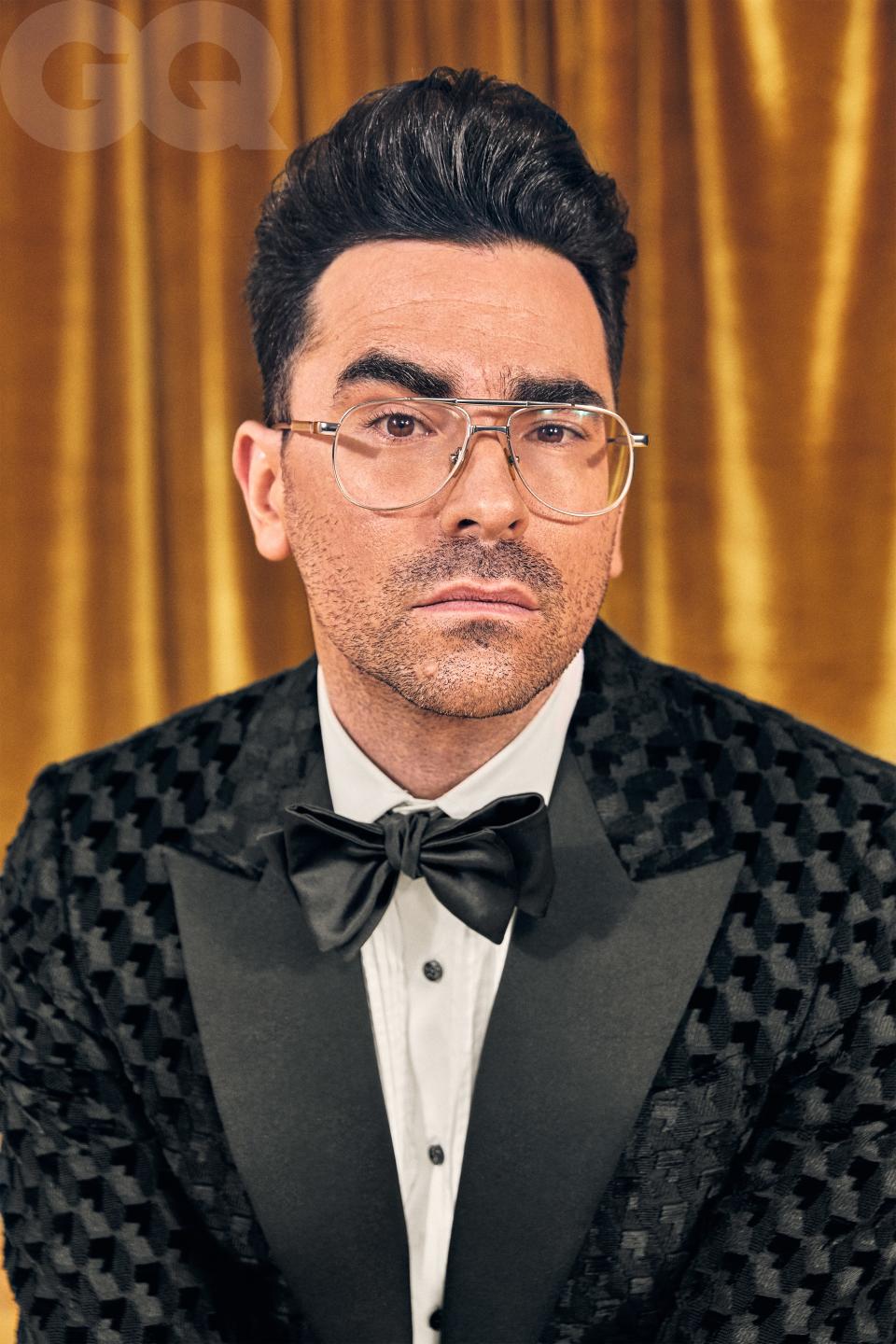
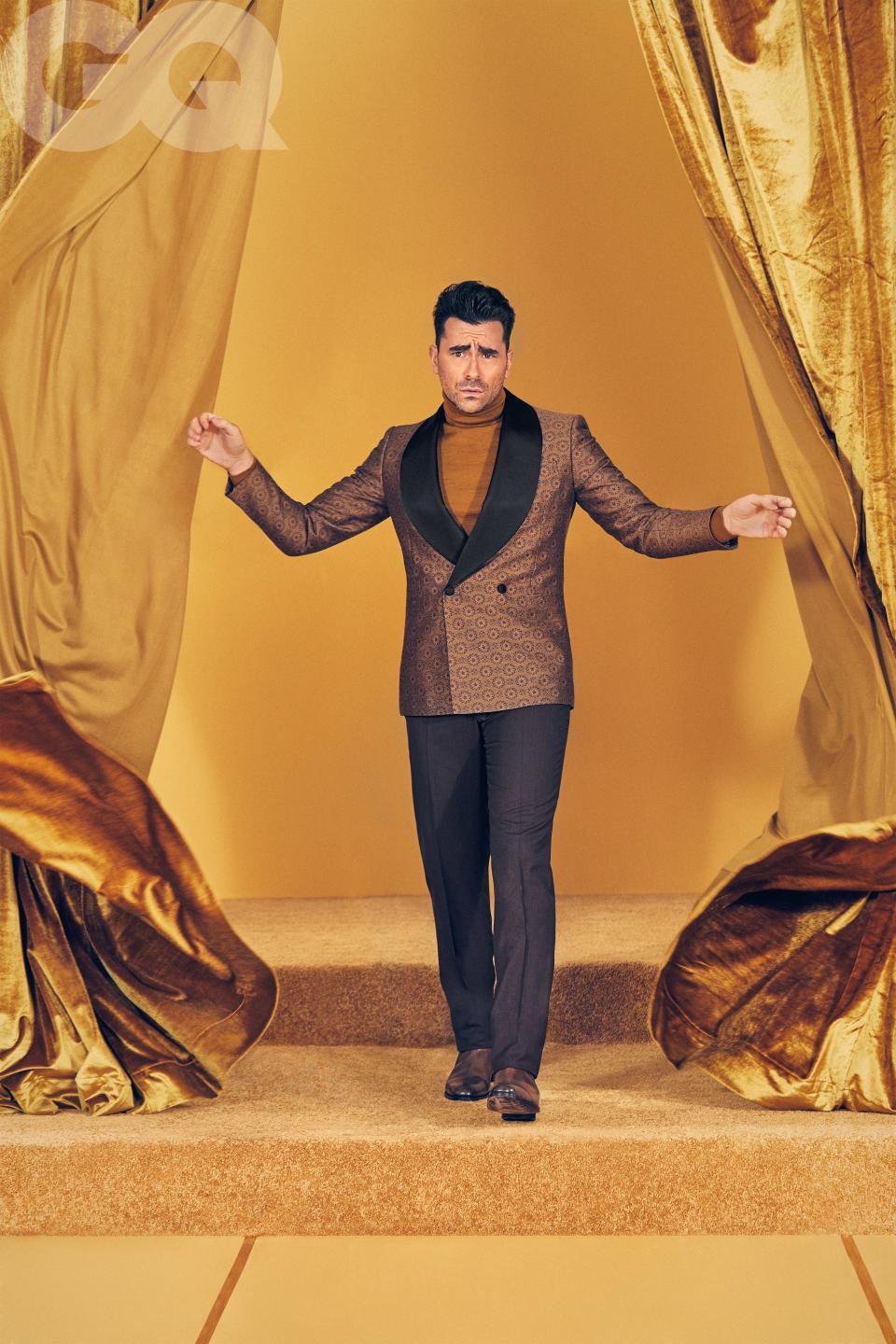
How did you decide to reprise that moment when David did the lip sync for Patrick?
When it came time to figure out what David could do to win Patrick back, I thought, What if it was a lip sync to the song that he had performed? Because that was what was so scary for him at first—so for him to do something like perform it felt like such a nice bookend for his emotional journey. Saying, "I'm going to risk my sense of cool to win this person back, because he means something beyond my own self-absorption. He means something that will quite physically force me into a very uncomfortable place."
And then we shot it. And that was probably the scariest scene I've ever shot in my life. I'm terrible at memorizing lyrics, and I don't dance, and I don't perform like that ever. So that was a panic the night before. And then Noah and I shared a bottle of prosecco at lunch, and came back from lunch, and that's what it was. I would like to say it was method. Even though my character isn't an alcoholic, I felt like he would've done something similar to that to ease himself into it.
One of the show’s most dramatic and most acclaimed stories came last year, when it was revealed that Patrick hadn’t come out to his parents. When and how did you figure out how to tell a coming-out story that avoided all the clichéd, often regressive tropes you often see in those narratives?
I knew the whole time that [Patrick] was not out to his parents, and that that was going to be his big secret. Not that harboring the secret of your sexual identity or orientation is wrong—but in terms of creating a tension in the show, there had to be something [about him] that wasn't perfect. Up until that point, it was the honeymoon phase of their relationship. Everything was great. So we had the daunting task of figuring out what the coming-out episode was going to look like. How were we going to tell a coming-out story that hadn't been told before?
It was, I think, the most challenging episode I've written in the entirety of the series. The minute that I realized [how to do it], I was [thinking about] a concern that has been dramatized in so many shows: parents being upset and asking themselves, "Did I do something wrong? Is it me? What did I do to have a queer kid?" [And I thought] what if their concern played into that—but the twist was that their concern came from "How did we not create a space comfortable enough for him to feel open and free to tell us?" Once we had that twist, I knew that there was a story there that felt kind of special, and that I hadn't seen before.
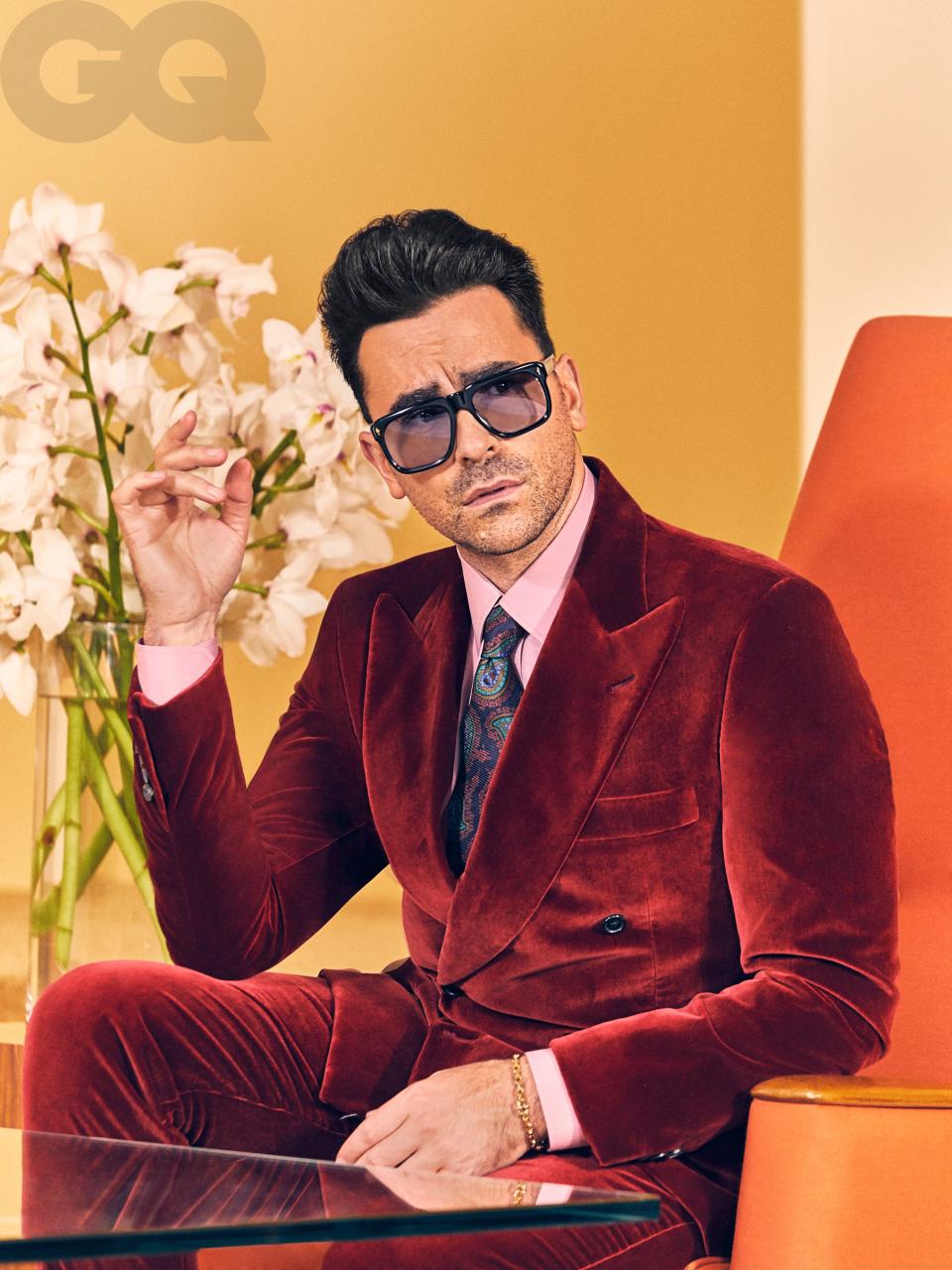
As a viewer, it was a relief to see one of their last major roadblocks get resolved, because so many sitcoms end up dragging out storylines, and manufacturing reasons, so they can keep the drama alive and avoid letting their central couples just be happy.
That was the biggest challenge for the David-Patrick stuff. Because I said to myself, "I can't. I won't do it." I won't do the will-they-won’t-they. I won’t break them up and bring them back together. I won't have that. I owe it, in a way, to myself. I want to see a successful queer relationship on television. I just want to see it! And I don't want to worry about it. I want it to grow. I want it to flourish. I want it to inspire other people. And I want comedy to come from it. Like, really good comedy to come from it.
What about Patrick proposing to David? His decision to propose with four rings, like David has always worn, was a particularly nice touch. When did that idea come to you?
I was lying in bed. I keep a notebook by my bed because I do a lot of thinking while I try to fall asleep. And I was in the middle of trying to fall asleep, and I thought to myself, He gives David four rings. He gives David gold versions of the rings that he wears every day. And I started weeping in my bed, alone, in the dark. It was very sad for me.
I was also crying because it saved me having to write some pretty major dialogue. I don't like writing exposition. It’s my least favorite thing to do. I hate writing dialogue that characters have to say to describe how they feel, or where they're going, or what they're doing, so anything we can do in terms of symbolic gestures or physicality can circumvent a lot of the crap. The idea that Patrick would be so in tune with David, and study him, and care about him, and know so much about him.
I wore them to the Emmys this year and got a handful of DMs from people being like, "You wore the rings!" And I was like, "Yes, I did! I wore them for you!"
This year—for the first time—Schitt’s Creek suddenly got the attention of Emmy voters, with nominations for costuming, Catherine O’Hara, your dad, Eugene Levy, and Outstanding Comedy Series. It’s extremely rare for a TV show to get that kind of attention that late in its run. Where were you when you found out?
I took my cast to Italy as a wrap gift instead of buying them something. We all had a week together, and we were able to sort of relax, and spend time, and make memories, and talk about our time on the show. I knew [the Emmy nominations] were coming out, but the time difference was so strange that I didn't quite know when. It was such a long shot. In the back of my mind I thought, Well, if we're lucky, I think Catherine has a shot. If Academy voters are watching the show. And then I started getting text messages from people saying, "Oh, my God, your dad." And I remember thinking, Is he okay? What about him? What happened? And then it was like, "Emmys!" And I was like, "What about the Emmys?" And then Catherine got nominated, and then the show got nominated. And I was by myself, in this house in the Tuscan countryside, because a group of my friends had gone to the grocery store.
It was one of the most surreal ten minutes of my life. I just ended up pacing around the house. I didn't have a ton of cell-phone service, so I was just frantically wandering around being like, Is this real? I don't think it ever became a reality until we were actually [at the Emmys], for me. Because we got it in our fifth season of our show, and it doesn't happen like that.
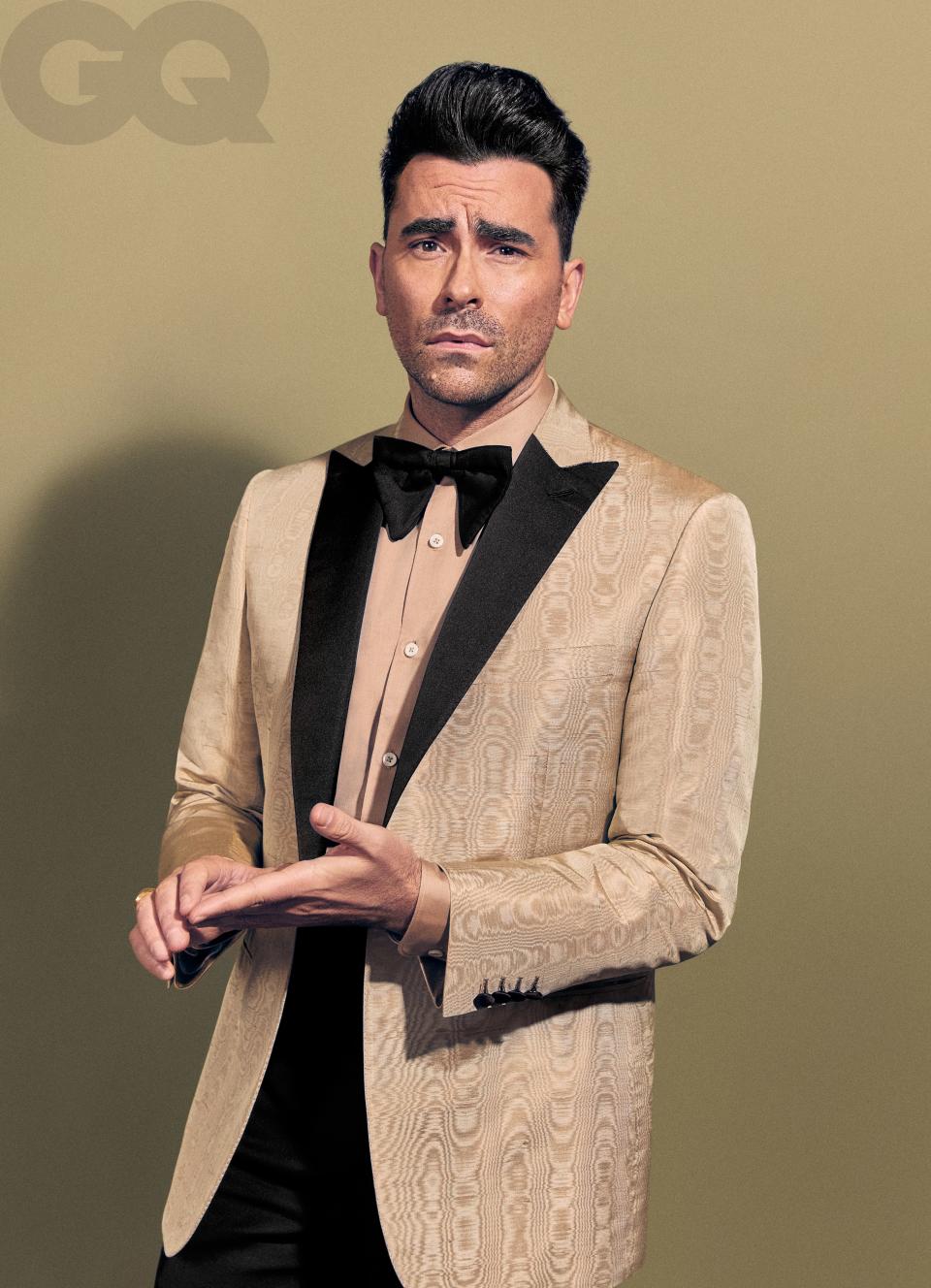
It feels like another signal that Schitt’s Creek is really resonating with people in 2019. And it’s interesting to see, through the reaction to this show, how telling an aspirational story—about the world as many would prefer it to be—might actually make more of a difference than telling a story that wallows in the darkness of everything.
It's been amazing to track the political climate with the shift in why and how people are watching television. I've been able to learn and watch as people who had originally watched our show saying, "This is very funny! Catherine's accent! The clothes!" Over the years, in direct alignment with what was happening in American politics, the reactions went from "This is very funny" to "I need this."
I don't know what would happen to this show if it had happened even five years before it did. We probably wouldn't be here. Just be inclusive. Be kind. It does wonders. You can really effect change in the smallest of ways by just showing how things should be.
And now, with Schitt’s Creek ending, you have a new deal with ABC to develop more TV shows. What can you say about what’s coming next?
I've kept, again, my nighttime notebook. Just filled with chicken scratch. I have a long list of ideas that have come to me over the past seven years while I made a conscious choice to focus on [Schitt’s Creek]. Some are comedies, some are dramas, some are thrillers. I don't consider myself a comedy writer. I really feel like, in actuality, we always approached Schitt's Creek like a drama. We considered it a drama that just happens to have very absurd people trying to navigate even more absurd circumstances.
I love crafting shows from the ground up. I love producing. I love that part of it. I think it's so challenging and exciting and all-encompassing. I think [Schitt’s Creek] really took a lot out of me in terms of energy and output. I'm going to need to take a break before I jump back in. But I'm also someone who's never not working. So I'm excited to sit down and have real conversations about what the next show is. Or shows are.
PRODUCTION CREDITS:
Photographs by Danielle Levitt
Styled by Jon Tietz
Grooming by Johnny Hernandez
Set design by Eli Metcalf
Click Here to See GQ's Best Stuff of 2019, Starring Dan Levy
Originally Appeared on GQ

